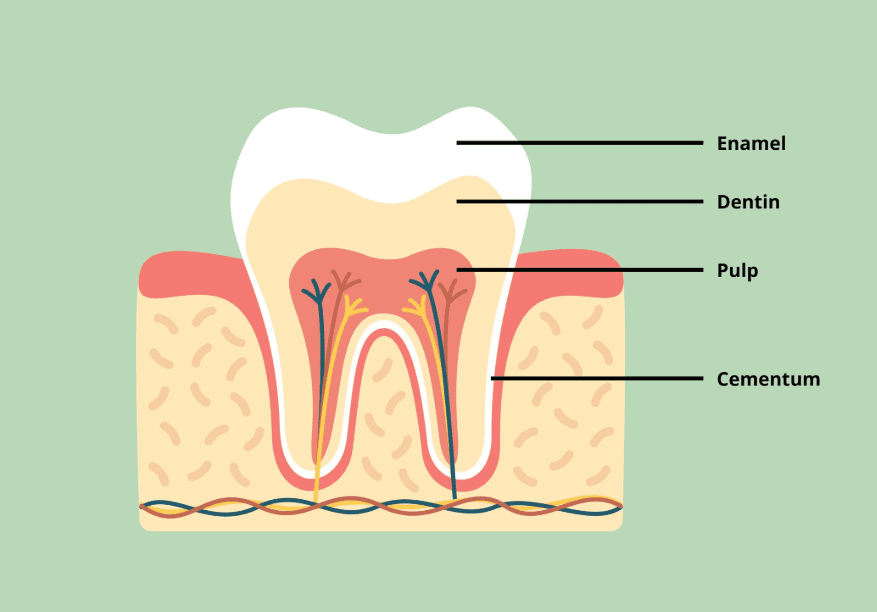Root Canals
If you have an infected tooth or an inflamed dental nerve, we recommend root canal therapy. Root canal, also called endodontic therapy or endodontic treatment, helps save healthy parts of a tooth while eliminating infected and unhealthy tissue. By addressing the infection within the tooth, we not only restore its strength and functionality but also alleviate the pain and inflammation that result from the infection of the inner tooth tissue.
Root Canals
Why You Can’t Ignore Tooth Pain
Many people believe that occasional tooth pain isn’t a big deal. But left untreated, the pain may become persistent or severe, which may be a sign of infection that needs to be addressed as soon as possible.
What Is a Root Canal?
A root canal is a dental procedure designed to save a severely damaged or infected tooth. When you have a root canal, the infected pulp (the soft, living tissue inside the tooth that contains blood vessels, connective tissue, and nerves) is removed from inside the tooth. A root canal allows you to keep your natural tooth, maintaining your smile and oral function.

Four Steps to a Root Canal Treatment
Root canal treatments are typically completed in four phases:
- Thorough exam to determine if a root canal is necessary. This includes:
- CBCT (Cone Beam Computed Tomography) to provide a detailed view of your tooth and its root structure.
- Diagnostic tests to determine the viability of the tooth. One of the more common tests is the cold test, where we place a cold stimulus (like a cold spray or ice) on the tooth to evaluate the sensitivity of the nerve.
- Removal of the infected pulp and thorough cleaning of the root canals of the affected tooth.
- Filling and sealing of the cleaned canals to prevent reinfection.
- Placement of a crown or other restoration to protect the treated tooth and restore its function.
In very complex cases, such as curved or hidden canals or retreatment situations, a referral to an oral surgeon may be necessary.
How to Know if You Need a Root Canal
Sometimes, you don’t know.
Many people believe that you only need a root canal if you are in a lot of pain, but this isn’t true. You may need a root canal even if there is no pain. Sometimes, the discomfort is only mild or annoying and just hasn’t gone away with the last crown or filling.
During our examinations of new patients, we sometimes find reinfected root canals and abscessed teeth with no symptoms. This is why regular checkups are so important. It’s also why dental radiographs are critical—so please, let us take them.
Even if you’re not in pain, regular dental hygiene checkups are critical to catch problems early and potentially save you from more extensive treatment later.
The Benefits of Root Canal Therapy
Pain Relief
A root canal eliminates the pain caused by an infected or damaged tooth.
Tooth Preservation
Having a root canal allows you to keep a natural tooth that might otherwise need to be extracted.
Prognosis
The prognosis for a root canal is best when it’s done as soon as possible, before the tooth begins to hurt.
Restored Function
A root canal allows you to continue chewing and speaking normally with the repaired tooth.
Prevents Spread of Infection
Many people don’t realize that a tooth infection can spread to other teeth and surrounding tissues. Performed early, a root canal prevents this.
Maintains Bite Alignment
Since it allows you to keep your natural tooth, a root canal helps to maintain proper bite alignment and prevents neighboring teeth from shifting out of place.
Cost-Effective
A root canal is usually less expensive than extraction, which would be followed by a replacement such as an implant or bridge.
Improves Oral Health
When you keep a natural tooth in place by having a root canal, you can preserve your oral health and avoid more complex procedures.
How Root Canals Vary by Tooth
A root canal procedure may be more or less complex, depending on the type of tooth.
Incisors and Canines
These teeth are closer to the front of your mouth and often have simpler root structures than molars, which may simplify the procedure.
Bicuspids
Bicuspids usually have two or three roots (or canals), with the anatomy being more complex than front teeth, but less complex than molars.
Molars
Back teeth may have more complex root systems and more roots to treat, but advanced techniques allow us to effectively treat even the most challenging cases.
Retreatment
In some cases where a previous root canal doesn’t heal properly or becomes infected later on, we can perform retreatment to save the tooth. This involves removing the old filling material, cleaning and disinfecting the canals again, and then refilling and sealing them to restore the tooth’s health and function.

What Should I Expect After My Root Canal?
Your tooth and gum tissues around it may be somewhat tender for several days. This is a result of the infection that brought you into our office as well as the endodontic manipulation during treatment. This is absolutely normal and is part of the healing process. You can expect your tooth to be sore for about 3-5 days. When you touch it, brush it, and chew, it can be tender. Remember: the more your tooth hurt prior to the procedure, the more tender it will be after the procedure.
Every patient is different and there are varying levels of discomfort. Some patients may even have discomfort for longer (i.e. several weeks). As long as it lessens every day, then you are likely headed in the right direction. Please make sure you continue to brush the area normally.
Why Choose Happy Tooth?
Dr. Augustyn has been passionate about endodontics since her DDS school days. She performed endodontic research as a freshman in dental school, completed more root canals than most of her classmates, and continued that trend as she graduated. She’s taken hundreds of hours of continuing education, advancing her skills in endodontics. Dr. Augustyn considers it one of her passions in dentistry. She is also passionate about saving teeth.
As a patient who has had nine root canals herself, Dr. Augustyn has been on the other side and can understand what a patient faces when they sit in her chair. That’s why she approaches each patient with understanding and compassion.
Happy Tooth uses state-of-the-art technology to make root canals as effective and comfortable for you as possible. We also take the time to listen to your concerns and explain every step of the process. Preserving your tooth matters to us, and we’re happy to help.
What Should I Do Next?
Contact us to schedule an appointment. If you’re in pain, please call now. We'll get you in as soon as possible to determine if a root canal is needed, then resolve the issue to get you feeling better.
















